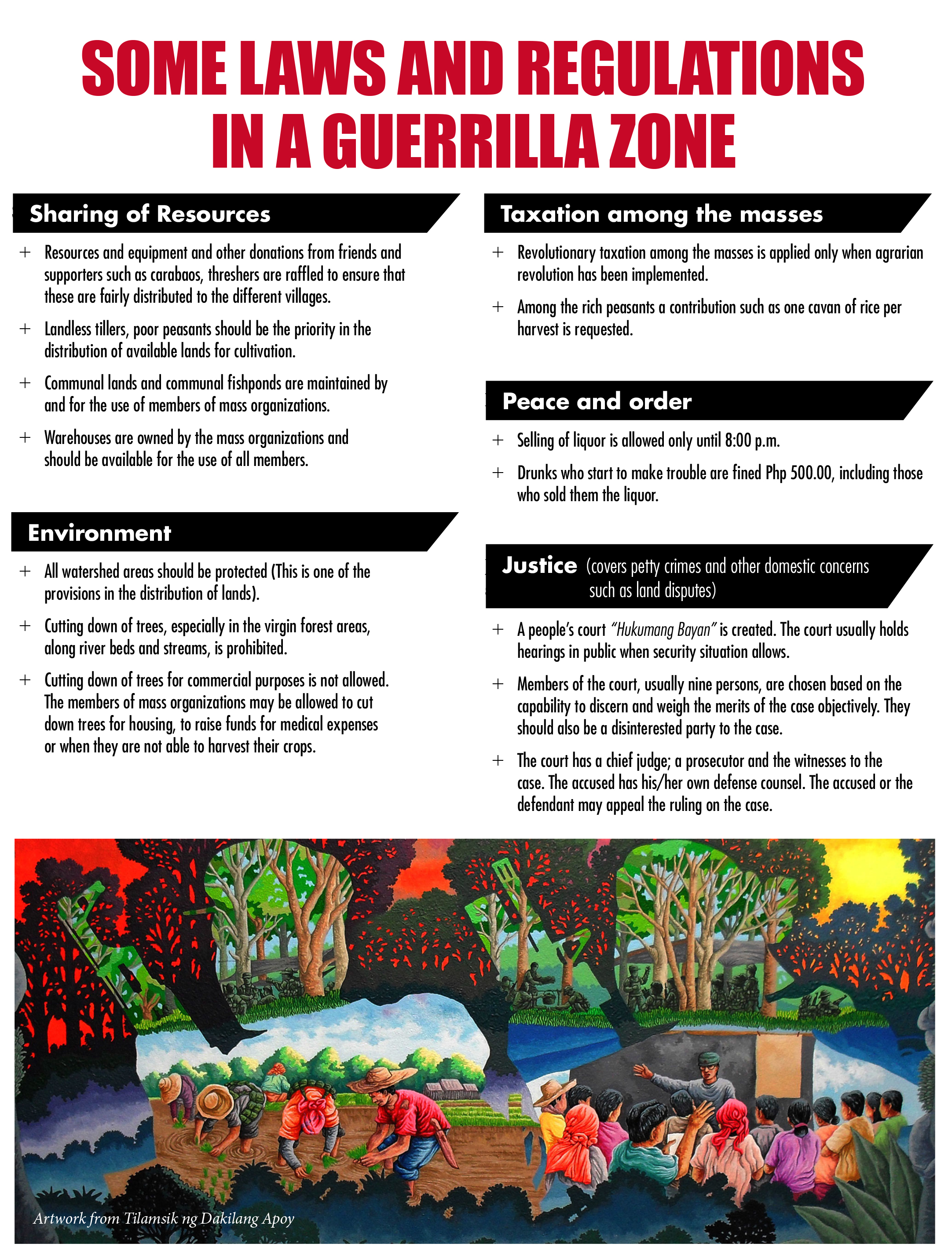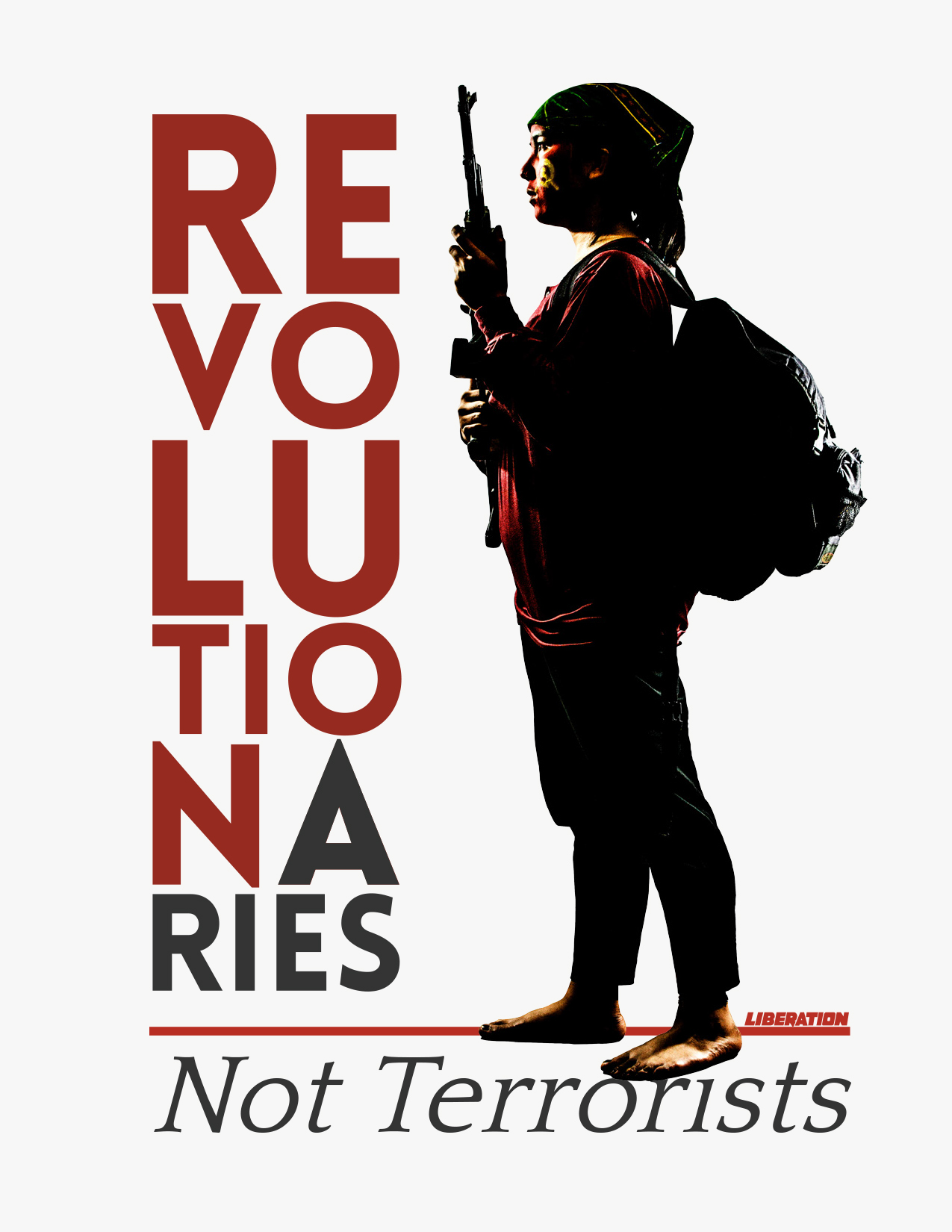THE REVOLUTION HAS NO GENDER

by Markus del Pilar and Pat Gambao
“If we were to be grouped together in this guerrilla front, we would make up a company. But that will not happen. Did you see how rowdy we were during the volleyball game? We could be extremely noisy.” They all guffawed at the idea.
Few are the times that they come together. In fact, some of them have just met each other. They belong to different guerrilla zones and as they said, they cannot be grouped together. Not because they are boisterous but because there is a particular need for them in the areas they were assigned.
They are members of the Pulang Bagani Battalion (PBB) of the New People’s Army (NPA). Revolutionaries. Bayot, gays.
The battle against discrimination
Ka Riko, a choreographer, related that their ‘ninunong bakla’ and ‘anitong bading’ (literally gay “ancestors” and gay “icons”) in the urban centers experienced discrimination from some members of the movement who considered homosexuality a weakness. The gays were criticized for their flipping fingers and swaying hips, especially during rallies. There was even a time when being gay was considered a security risk.
The growing number of gays and lesbians in the Party necessitated thorough studies, ideological remolding and a policy guide for the proper attitude towards members who have expressed their sexual preference. Said efforts are aimed at mitigating if not all together effacing gender discrimination.
Among these was “On Proletarian Relationship of the Sexes (OPRS)”-a Party document to guide relationships and marriages. During the 10th Plenum of the Communist Party of the Philippines (CPP) included the gays and lesbians’ equal rights and accorded recognition of their sexual preferences, as well as the relationships and marriages they opt to enter into.
Also, in due time, the gays have proven their worth. That the flipping of their fingers and the swaying of their hips have nothing to do with their ability to lead and carry out tasks, including military tasks.
However, the process of acceptance and recognition of the rights of the non-straight members has not been easy. Aside from the unequal development of members in the movement, the influence of the bourgeois culture and society that looks down and discriminates on lesbians, gays, bi-sexual and transgender (LGBT) is strong. Persistently combating this depraved influence is imperative.
Ka Duday, one of the members of the PBB’s medical staff, disclosed how uneasy he was at the start. He did not know how he would place himself. “I can’t take a bath with the men because it will violate the rules. I can’t join the women because they might think I am taking advantage of them. Then somebody remarked that gays have no place in the revolution. Severely offended, I got demoralized. I left the movement. But at home there was nothing I could do but cry. After a few months, I sent word I will return and assess with them.”
Ka Duday believed that combating the debased culture of this bourgeois society we were born into and initiating change would fruition from the collective struggle of the gays, lesbians and straights in the national democratic revolution. Party documents are available to enlighten gays and lesbians that they are not divorced from the oppression and exploitation suffered by other genders. Thus, it is important that they take an active role in the people’s revolution.
“But we cannot send the message and convince them of the exigency for revolution if we ourselves are undisciplined,” Ka Duday said.
Meanwhile, Ka Riko shared their experience during an encounter with the military in 2000 where they were put in the defensive. They had a difficult time withdrawing from the enemy. The military was advancing fast. Then, one of their comrades, a gay, positioned himself away from the NPA main unit and fired at the military to divert their attention. This diversionary tactic enabled the NPA unit to maneuver and withdraw. “Proud!” Ka Riko exclaimed.
That incident served as a turning point of the way gays in their unit were treated. They made fun of them still but this time, with fondness unlike before when they felt people were avoiding them. With pride Ka Riko remarked, “Gays in the movement are awesome-brave and real fighter.
They fondly remembered Wendel Gumban-Weng to his family, Wanda to his friends and comrades in the city and Ka Waquin to red fighters of the PBB and the Lumad-was martyred. A graduate of Tourism from the University of the Philippines, Wendel set aside personal ambitions to serve the masses and the revolution.
“Apart from his being a gay warrior, Ka Waquin’s dedication to the service of the people is an undying inspiration, not only to us, gays, but also to many comrades and the masses. He has proven that being gay is no hindrance to fire a gun, especially if it is for national liberation,” Ka Duday professed.
Getting out of the closet
Aside from confronting the enemy, they know there is also a need to courageously confront internal contradictions. Getting out of the closet would invite being belittled, ridiculed and loathed.
“Since high school I already knew I was gay but I hid it from my family. I mingled with the NPA but I had no plan to join them. I merely assisted them when able. If you came from a family of peasants you would always yearn to uplift your family from their deprivation. Thus, I worked as a security guard in the city. However, I could not stand the exploitative situation that security guards are in. It is a worthless sacrifice. I left my job and contacted my friend in the NPA to express my desire to join them,” Ka Princess related.
“For more than a year, I concealed my real self from our group. But it bothered me no end so I opened up to Ka Bob, a member of the higher committee. I requested him to discuss it with the committee. I did not know how they would react but it was the least of my worry. The important thing was I got “out” and felt relieved,” Princess added.
Princess expected derision from his comrades and the masses after they learned the truth. But that did not happen. In fact, some of them were in disbelief.
“If you really want to hide your real identity you will do everything to avoid suspicion,” Ka Princess explained.
In one of the anniversary celebrations of the CPP, Princess invited his family. It was there he admitted to them his sexual preference. At first they were shocked, but after explaining himself to them they heartily accepted him as he was.
Ka Princess felt liberated after that confession, as if a big thorn was taken out of his throat. He joined the NPA as Ka Marco, now she is Ka Princess, a political guide of a platoon.
For Ka Awra, being Moro and gay is a double burden.
“I used to envy my friends in the city because many of them, both men and women, were proficient with the gay lingo. I got the impression they very much welcomed gays. I learned later they already suspected me to be one, because I was demure and gentle. But they never asked me about it nor made me admit it. In 2005, I was invited to a launch of the organization of gays and lesbians. I was wondering why I was invited. During the self-introduction, one had to state his/her name and his/her gender-gay, lesbian or bi-sexual. When it was my turn to speak-there, I came out and my “career” as Awra Alindogan was unexpectedly launched. Bongga! (great!),” Ka Awra, an education officer, marveled at the reminiscence.
Ka Awra discovered after the revelation that there are much more he can do and contribute to the revolution-he can write, he can dance, he can strut his cultural prowess to spice up his organizing and instruction work. He had opened up to his comrades and the masses. He realized that the masses will accept and love you whatever your gender is for as long as you could help them with their problems; they see you at the people’s court resolving issues; they are enlightened and they learn from your instruction, be of the Party courses or simply to read and write. For as long as you are with them in charting plans and programs that will serve their interests, they will wholeheartedly accept you.
Ingenious Gay
“There was that time when our camp was raided and all our belongings were taken away. The masses, learning of the incident, sent me a bagful of things to replace what I lost. The gesture so touched me that I was teary-eyed with joy. I wrote back to thank them. The masses so loved the people’s army. They are always excited to meet and exchange pleasantries with us whenever we are around,” Ka Awra narrated.
Awra expressed her realization that respect is not earned by hiding one’s true self. In the first place, there is no need to hide nor deny one’s preferred gender. If one does his/her job well, has good rapport with everyone, abides by the policies and programs of the revolutionary movement, there would be no complication. This does not apply to gays alone. All the men and women need to carry out their tasks well for the revolution. In this way, they will surely gain the trust and respect of their comrades, as well as the masses.
Once he was assigned to lead a team in a special military operation. He vehemently refused, especially because his long hair will have to be cut. He was crying throughout the time his hair was being cut. “Ayoko na mag-struggle (I no longer want to be part of the struggle),” he said laughing as he recalled the incident.
But at the end he realized he should not prioritize personal desires over his revolutionary tasks. He finally accepted the task and they rehearsed how to carry out the operation. He was to man a checkpoint supposedly of the AFP. During the actual tactical operation, there were “directors” who coached him. They called his attention whenever his voice and action started to soften up. But they let him be himself when there were no other people around. He could sit down with legs crossed. He could fan himself with gusto. But when there were other people and vehicles, he had to return to his “AFP character” and did the ‘role’ successfully,” remarked Ka Awra.
“After the operation, we all felt the fangs of hunger as we packed our things. Seeing a fruit delivery truck approaching, members of my unit requested me to ask for something to eat. Although vexed, compassion took the better of me and I stopped the truck to ask for food. I was already in a sando shirt but, still in fatigue pants. I used my charm. However, those in the truck were still able to identify me with the NPA because they said nobody in the AFP would admit they are gay. We learned later that they came from one of the barangays where we had mass worked before,” Awra continued.
Liberation Movement
The recognition and respect for the rights of gays and lesbians by the CPP is a big stride forward for the gays and lesbians. The movement will continue to gain more insights and lessons as it advances the national democratic revolution. The movement may encounter enormous obstacles on the way but, guided by the Marxist-Leninist-Maoist principles, they will be able to clear the path to victory. The comrades, cadres and masses are there to substantiate, live by and further enrich the lessons learned.
According to Ka Riko, it could not be helped that gays may still encounter problems, especially with comrades who have not fully shaken off the bourgeois culture they grew up in. But this is where the CPP differs from all the other political parties. It recognizes its weaknesses, learns from these and rectifies, so thus its members.
“The revolution does not discriminate on gender. The gun has no gender. The aspiration to serve the masses and win the revolution to institute real societal change binds us all-men, women, gays, lesbians,” Ka Princess added.
“It is only proper for all gays and lesbians to join the revolutionary movement. It is only through armed revolution that we can promote and build a society which beauty is not only at the surface but also emanates from the core of complete freedom,” Ka Duday concluded.
More than the recognition of their rights, the Party has equipped the gays and lesbians with MLM theory and practice to enable them to liberate not only their sector, but also all the oppressed classes. They are equipped to enable them to smash the conventional belief that the gender they have chosen is only for beauty salons and that their talents are only for entertainment. They are equipped to be able to join and lay down the foundation of a society that is free from the fetters of exploitation and discrimination.###
#Pride2018
#RevolutionariesNotTerrorists
#ServeThePeople
THIS WAS ORIGINALLY PUBLISHED IN FILIPINO
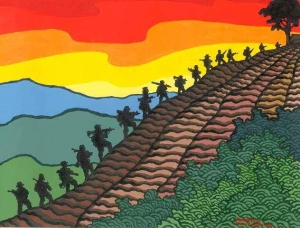

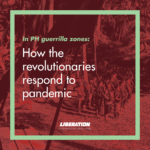
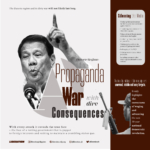
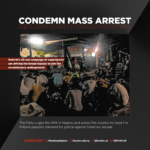


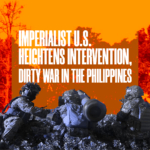
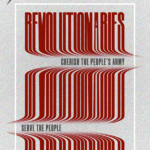
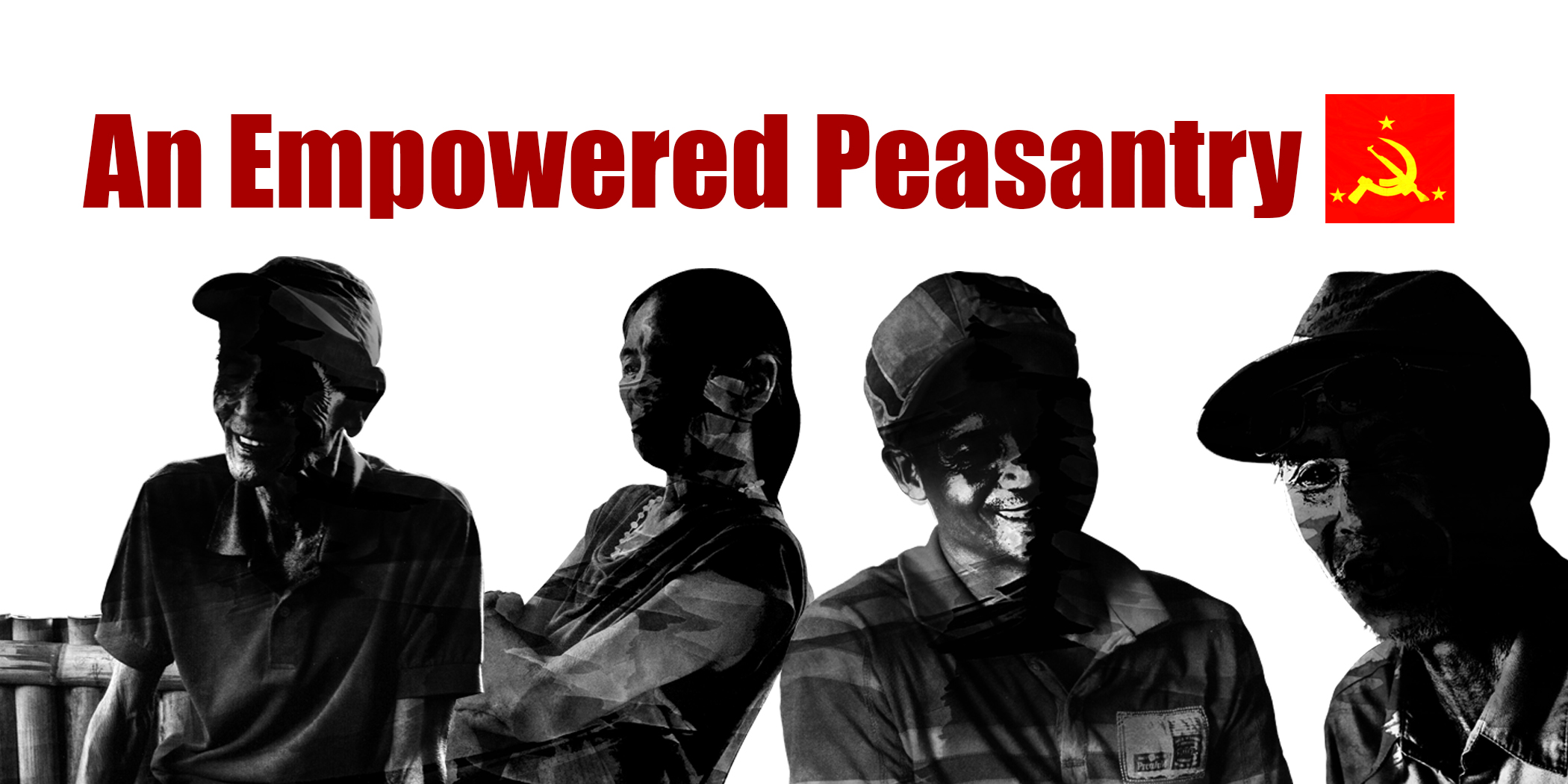
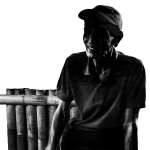 “Kung malayo pa ang pupuntahan natin, mas malayo na rin naman ang pinanggalingan. Ituloy-tuloy na natin.”
“Kung malayo pa ang pupuntahan natin, mas malayo na rin naman ang pinanggalingan. Ituloy-tuloy na natin.”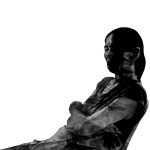 “There’s joy in our hearts because we are able to contribute to the resolution of the problems of the majority of the poor in our country.”
“There’s joy in our hearts because we are able to contribute to the resolution of the problems of the majority of the poor in our country.”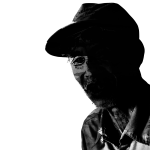 “There was fear but we were not intimidated.”
“There was fear but we were not intimidated.”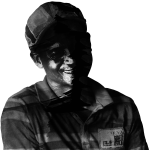 “What is important is we have rectified the errors and we have now grown stronger.”
“What is important is we have rectified the errors and we have now grown stronger.”